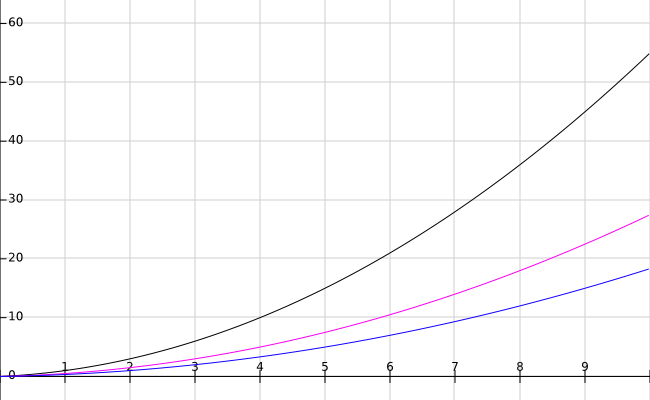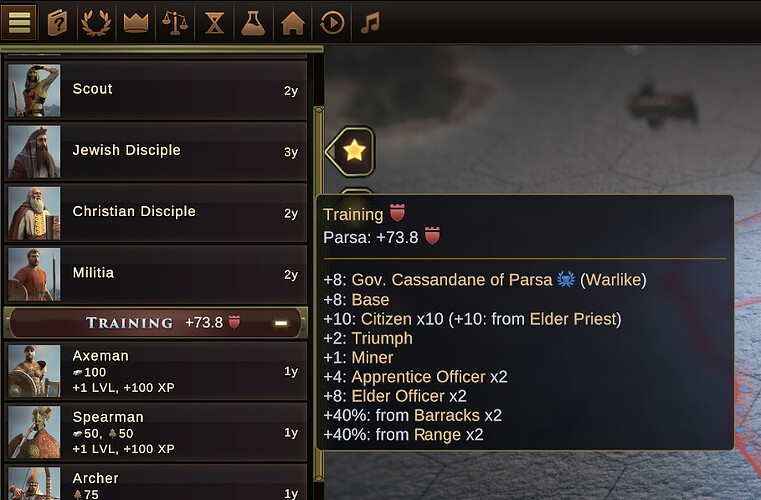Thanks for this summary by the by. I was reviewing the posts and realized somehow I missed yours first time around. Thanks!
Morning all! Yes, change to legitimacy is in the doc, but I’ll also add the bit about inside a rival nation’s borders too. And blockade, tho I think that also applies to troops parked on a road tile (same effect - cutting a city off from trade network, so that needs a mention too).
I like the UU for Rome, but agree that it’s not flashy like Cimmerians or Paltron cavs (the two best, IMO). Still, it’s a rock-solid infantry killer and nigh on indestructible, and that’s nothing to sneeze at! :)
For the way I play, Assyria has the best shrines, but Rome’s are undeniably great too. My priorities are Ashur (civics) and Smash (i know that’s spelled wrong…lol) for the half order, but the others are situationally good too.
This morning’s stream, beginning in about an hour, will be back to the babylon game…mmmm…Cimmerian goodness… =D
@Velociryx: do you have any strategy thoughts on the asymmetry between the different types of production? (How they’re generated, what you build with them and where unused production goes.)
For example, training always has global effect: either it produces military units or goes into the global pool. Civics are much more local though, in their production of buildings, projects and specialists. This makes it easy to forego training development in many cities but difficult to skip civics development.
Perhaps relatedly I’ve personally been having difficulty producing a truly powerful military pump city. 30 or so training seems to be the most I get to usually, while it’s far from uncommon to see a city producing 50 civics.

Black - Monarch
Pink - Heir/Advisor
Blue - Courtiers
But I think this is again modified by opinion.
Barracks and ranges are huge, both because they act as multipliers and allow you to generate more shields to multiply via their specialists. In the early game, when specialists are less available and/or more temporally costly, the rare shield producing resources that require no specialists are awesome.
This isn’t optimal, but is my ~1 unit per turn military hub in my current game.
You have used a theology to get 18 of that, and the governor provides another 14 (which often has the cost of taking them away from commanding a unit).
I think the main missing piece here in how I’m playing is that I rarely seem to end up with ranges. I tend to get barracks up relatively early, but there are always more important techs than the one that opens up ranges.
@rho21 I don’t have any firm thoughts or observations on it, other than I tend to use a “pendulum approach” to spending civics/training, tending more toward troop building/projects and specialists depending on which resource I don’t currently need as much of in the national pool, but your general sense of the resources sounds like it’s pretty much in alignment with my own.
Since civics does tend to be more local, I do try to make sure that every city has a triad of quarries, so I can get three stonecutters to help boost civics per city, which ensures I’ve got a decent platform to build from.
I don’t much care how long it takes to build troops out of smaller cities, but will happily set them to chewing on a unit if I need to preserve civics to actually run the country, so I tend to wind up with barracks everywhere as a consequence (and later, ranges)–even tho I don’t especially care about training times, I do prefer to get the troops sooner, rather than later, so unless I’m doing something specifici re: tile development, I don’t mind pulling a worker off of whatever he’s doing to plonk down another barracks or two.
@davehemke Wow, thank you! :) Those curves look about right to my brain and yep - they would be further modified by relationship values, for sure, tho I am not clear on the exact effects there.
It may help to think of the triangular numbers as adding each new level to your existing bonus.
So at 1 of a stat you have a bonus of 1. When you move to 2 of the stat, you add 2 to that bonus to get to a total of 3. Stat 3 => 3 + 3 = 6. Stat 4 => 6 + 4 = 10. Stat 5 => 10 + 5 = 15. Etc.
I believe the same happens negatively when you go below zero.
The rounding will only happen when you have a divisor (i.e. for heirs, advisors and courtiers and for an unhappy spouse). I’m not entirely sure what is meant by the proviso you quoted. My guess would be that it means that it’s using odd-even rounding, which means that if the calculated bonus is precisely half way between two whole numbers, it rounds to the even number. i.e. 2.5 => 2, 3.5 => 4.
If so, that gives this table:
| Stat level | Ruler + Spouse | Heir (1/2) | Courtier (1/3) |
|---|---|---|---|
| 1 | 1 | 0 | 0 |
| 2 | 3 | 2 | 1 |
| 3 | 6 | 3 | 2 |
| 4 | 10 | 5 | 3 |
| 5 | 15 | 8 | 5 |
That’s great Rho. I just check my 5 leader has 16 not 15. For the manual, I think it would be great to also include the multipliers. 1 becker, 2 civics, 4 shields, 8 $.
OK, sounds as though that proviso means something more complicated then. Hmm.
Just going to make a small note, when talking about characters, the manual refers to all characters as ‘he’ (and obviously in the game itself there are both genders for basically all character stuff). I assume it was not a conscious or active choice, because in one single place about ambassadors specifically it says ‘he or she’.
I used tooltips in my current game to get the actual numbers for global bonuses from stats:
| Stat level | Leader | Spouse / Heir (1/2) | Courtier(1/3) |
|---|---|---|---|
| 1 | 2 | 1 | 1 |
| 2 | 4 | 2 | 1.3 |
| 3 | 6 | 3 | 2 |
| 4 | 10 | 5 | 3.3 |
| 5 | 16 | 8 | 5.3 |
| 6 | 22 | 11 | 7.3 |
So the spouse / heir / courtier multipliers are just that: a straight up multiplier to the amount produced by your leader.
This does sort of fit triangular numbers; the proviso about odd numbers was actually saying that when the triangular number would be odd, add one to it.
The multipliers for stat type (compared to the table above) are:
| Stat | Production | Multiplier |
|---|---|---|
| Wisdom | Science | x1 |
| Charisma | Civics | x2 |
| Courage | Training | x4 |
| Discipline | Money | x8 |
There are also multipliers for relationship, of course, which work differently for positive and negative stats. For example, upset decreases any positive amount by 50% and increases any negative amount by 50%.
Fantatic work, Rho! Will add to the guide!
Added the tables to the guide in our new Appendix section!
RE: he/she - yeah…I went thru and tried to change as many as I could find but there are probably still a few lurking, and in some cases, like, talking about Cyrus…he really was a he, so…but yep. I’m sure there are still a few lurking.
btw - I’m sooooo excited! I just got an email from the Intergalactic Council! They’re saving a seat for me, and all I have to do is send them three easy payments of $39.95, and…
shakes head
Who falls for this stuff? lol
A bevy of small, incremental changes today, and added a new table in the appendix section (Cognomens)
Notes on rushing and faux rushing added. Began building the table for specialists in the appendix.
Extremely useful. Thank you!
Aside from Achievement badges and Legitimacy, is there no other benefits to Cognomens?
Hey Habibi, and thank you! Re: Cognomens, not that I can discern, no…however, there is a potential neg to relationship status with other leaders if your cognomen is “better” than theirs (they get jealous).
Not sure if it’s possible, but would love a markdown / github / wiki version of the manual.
But these are quibbles – the manual itself is amazing in terms of showcasing the game’s strategic depth (and pointing out which way to begin to think about some of the challenges the game poses) – thank you again for writing it!
